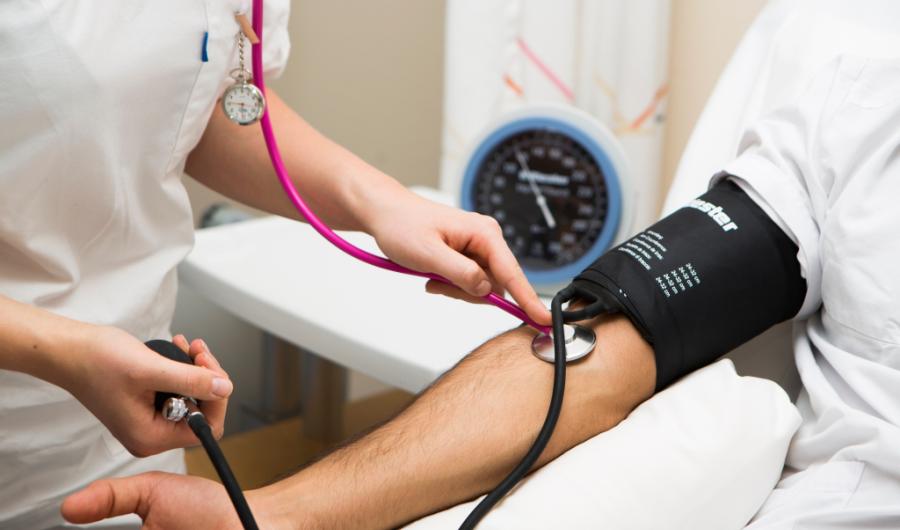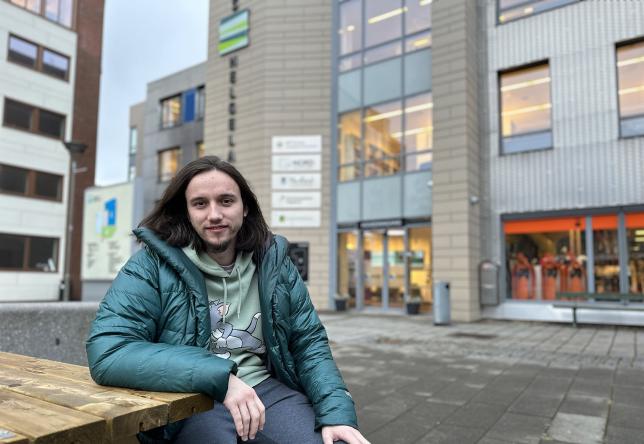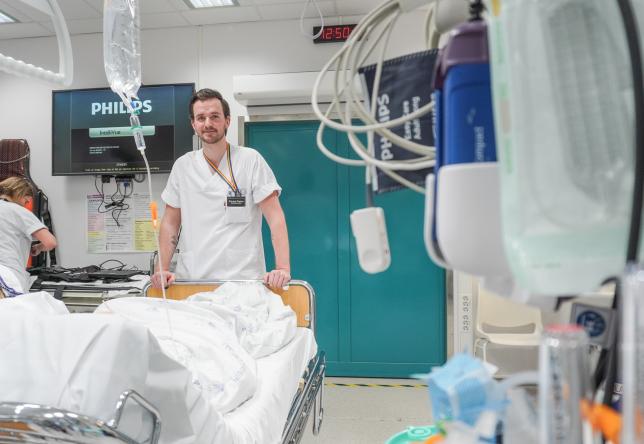
Programme description
As a nurse, you will be close to people during the most important moments in life. During childbirth and at the end of life. Nurses are present in situations in which people have been affected by illness, serious injury or critical situations. When people recover and when people have to live with illness and pain. You will often have to think and act fast, you need to be professionally skilled and you will have a very important and meaningful job.
Theory and practice go hand-in-hand. Half of the programme comprises supervised professional training and you will have the opportunity to learn and experience what it is like to work as a nurse. The goal is to ensure that you become a safe and professionally skilled nurse.
Career opportunities
A bachelor’s degree in nursing will provide you with many job opportunities in both the public and private sectors. Some of the places you could work include: Hospitals
The Municipal Health Service - community nursing and nursing homes The Ambulance Service
Rehabilitation Offshore Armed Forces
Occupational Health Service Health Information International Aid
Supervised professional training constitutes 50% of the study programme (90 credits) and consist of skills training and simulation in the University’s skills departments, preparation and reflection on supervised professional training and supervised professional training in cooperation with patients and relatives:
In supervised professional training in direct cooperation with patients and relatives, the student works together with experienced nurses and others when meeting people in need of nursing care. Professional training studies are supervised. Nord University allocates training placements. Students are not permitted to find their own training placements. The supervised professional training studies take place primarily in the health services located in the northern part of Trøndelag and Nordland.
The nursing education also offers certain supervised professional training studies abroad. The organisation of and other provisions concerning the supervised professional training are described in a separate document.
Admission to the programme of study requires Higher Education Entrance Qualificationwith specific entrance requirements.
Applicants who do not have Higher Education Entrance Qualification and are 25 years of age or older may apply for admission on the basis of prior learning and work experience.
Special admission requirements:
You must have:
an average grade of 3 or higher in Norwegian (393 hours) and an average grade of 3 or higher in mathematics (common core subjects, 224 hours)
You meet the grade requirements in mathematics if you have passed one of the following common programme subjects: S1, S2, R1 or R2.
Free courses in mathematics:
Unable to meet the admission requirements for mathematics? Together with Nettskolen i Nordland, we offer a free mathematics course for those living in Nordland or Trøndelag who need to improve their grade. Read more about the course.
Prior Learning and Work Experience:
In addition to the general requirements regarding prior learning and work experience at Nord University, the following subject-specific requirement for admission based on prior learning and work experience applies A minimum of five relevant man-years of work experience.
Work within the health, social, care and teaching sectors or similar where the applicant has worked with patients, clients or pupils. Compulsory military service and care for one’s own children can be approved as up to one year of work experience.
The requirement regarding the subjects of Norwegian and mathematics cannot be assessed based on prior learning and work experience. You must have grades in these subjects
Other requirements:
For admission to supervised professional training, a certificate of good conduct will be required for municipal health and care services, as well as a completed form for tuberculosis and MRSA
As a nursing student, you can take parts of your studies abroad. The experiences you gain from student exchanges will provide you with both knowledge and memories for life. You may participate in a student exchange during the fourth or fifth semester.
The nursing programme at Nord University collaborates with around 30 institutions in Asia, Europe and the USA.
Expected skills upon completion: The sections referenced in the learning outcomes relate to the “Regulations relating to the national guidelines for nursing education”.
Knowledge:
Have broad knowledge of the basic needs of human beings, the anatomy and physiology of the human body and the most common diseases, symptoms, clinical pathways and treatments. (Section 4)
Have broad knowledge of the functional areas of nurses (health promotion, prevention, treatment, rehabilitation, relief and palliative care). (Section 4)
Have knowledge of digital tools, E-learning programmes and available online learning materials. (Section 19)
Have knowledge of nursing science and other relevant health sciences, as well as the theoretical basis for how scientific work is developed within the field of study. (Section 10)
Can update their professional knowledge regarding both theoretical and practical issues. (Section 10) Have knowledge of tools and methods for service development and innovation. (Section 16)
Have broad knowledge of key values and concepts in nursing, the historical development of nursing and its importance to professional and service development. (Section 7)
Have knowledge of how the health services are managed and organised. (Section 13)
Skills:
Can apply academic knowledge and relevant results from research and development work to theoretical issues and make justified choices. (Section 11)
Can apply systematic observation, assess, decide, implement and document appropriate nursing activities in practice, as well as evaluate effect and adjust as needed. (Section 5)
Have the cultural skills to assess, plan, implement and evaluate nursing in a national and international context (Section 5) Can reflect on their own professional provision of nursing care to patients and relatives and adjust this under supervision. (Section 8)
Can identify and critically assess relevant information in academic and research literature to highlight nursing issues. (Section 11) Can manage mapping, assessment, documentation and communication tools when practising the nursing profession. (Section 14)
General competence:
Have insight into nursing’s work-related ethical guidelines and professional issues, and can manage various situations based on these. (Section 9)
Can plan and carry out work tasks and projects over periods of time, alone and in collaboration with patients, relatives, fellow students and others and in line with ethical requirements and guidelines. (Section 12)
Can convey key subject matter such as theories, issues and solutions both in writing and orally and by using technology and digital solutions. (Sections 12, 21)
Can plan and carry out communication and interaction processes with other professional groups and, through interdisciplinary cooperation, contribute to the development of good nursing practice. (Section 9, 12)
Have knowledge of challenges to quality that require innovation and can plan and carry out service development in collaboration with patients and relatives. (Section 18
In addition to semester fees and literature on the reading list, expenses must be expected regarding additional housing, travel expenses etc. in relation to supervised professional training, cf. Nord University’s guidelines.
It is assumed that students have their own laptop computers. Webcams and headphones are regarded as standard equipment in relation to digital communication during the programme of study. Students must cover these costs themselves.

Mathias fra Toten lever sykepleierdrømmen på Helgeland: nordlendingene er sykt trivelige!
– Det er bare muligheter om du blir sykepleier


